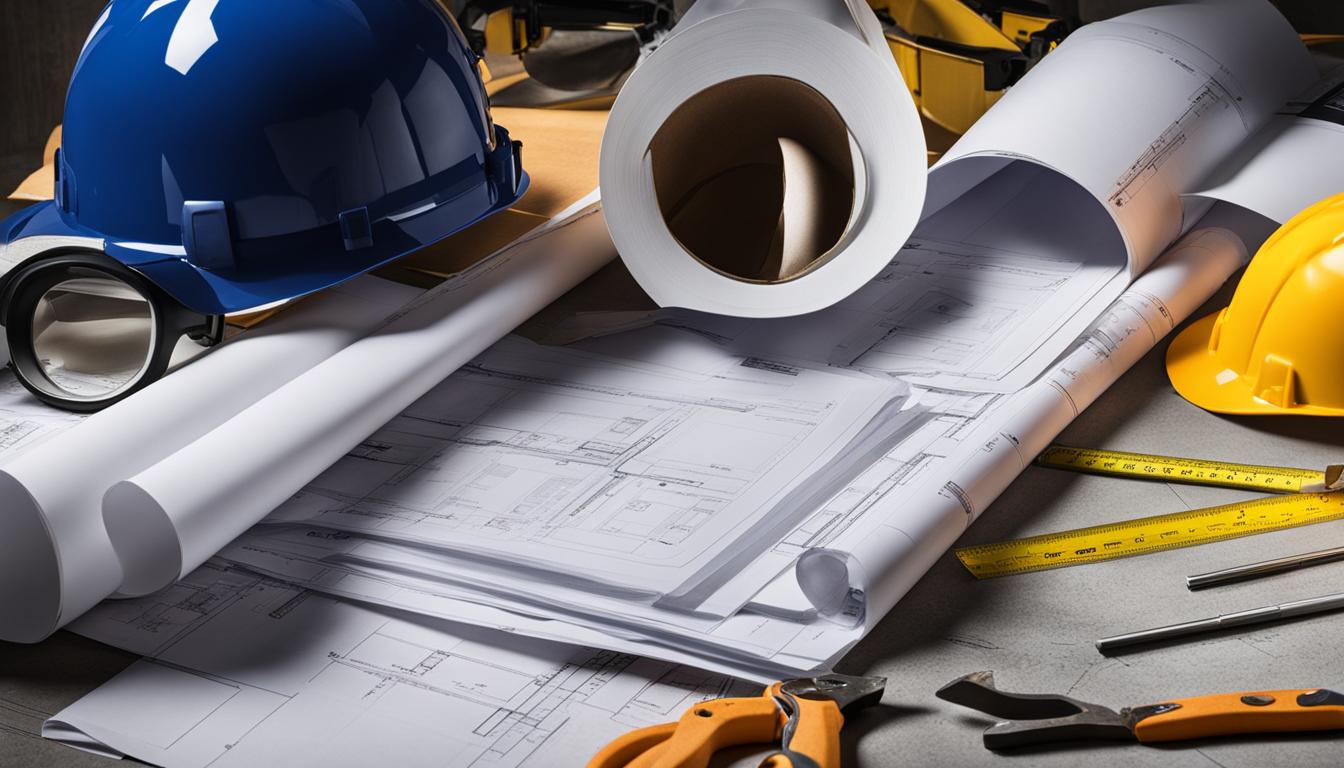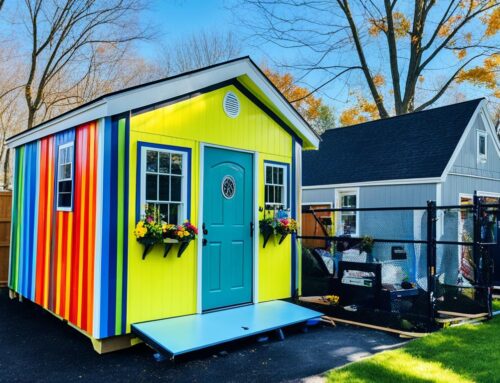Are you planning a construction project or considering making changes to your property? It’s essential to understand the ins and outs of obtaining a building permit. Building permits are official approvals issued by your local government that ensure compliance with building codes and regulations. By obtaining a building permit, you not only ensure the safety of your project but also prevent potential legal complications and obstacles in the future.
Key Takeaways:
- Building permits are necessary for new construction, renovations, and structural changes to a property.
- Contact your local building department to determine if you need a permit for your specific project.
- The building permit application process typically involves submitting a permit application form, additional documents, and paying a permit fee.
- Building without a permit can lead to fines, demolition orders, and potential liability for property damage or injuries.
- Understanding the building permit process and complying with the requirements ensures a smooth and legally compliant construction project.
Traci’s Permits offers unparalleled expertise in navigating the building permit process in Suffolk County and Nassau County on Long Island. Our team ensures timely approvals and code compliance, saving you time and headaches. For expert permit assistance, call us at 631-492-0927.
What Is a Building Permit?
A building permit is an official approval by your local government that allows you, or a hired contractor, to construct something new or remodel an existing structure on your property. Building permits ensure homeowners comply with local building codes and standards, which are in place to ensure the safety and integrity of structures.
Obtaining a building permit is necessary before starting any construction or remodeling project. It is one of the first steps that need to be taken to ensure that your project is legal and meets the necessary building requirements. Failure to obtain a building permit can result in fines, delays, and even legal consequences.
Building codes are regulations set by local governments and are specific to each area. They outline the minimum requirements for design, construction, and materials to be used in building projects. These codes are in place to protect the health, safety, and welfare of the public.
When you apply for a building permit, your plans and proposed construction or remodeling work will be reviewed by the local government’s building department. They will ensure that your plans meet all the necessary codes and regulations. Once approved, you will receive a building permit that allows you to start your project.
“Building permits are essential to maintaining the safety and integrity of our properties. They ensure that structures are constructed or remodeled according to established standards, protecting both homeowners and communities.”
Building permits are required for various types of projects, including:
- Additions or expansions to existing structures
- Remodeling or renovation work
- New construction projects
- Electrical or plumbing work
- Changes to the structural layout
It’s important to note that building codes and permit requirements can vary from one jurisdiction to another. Local governments may have additional regulations or specific guidelines that need to be followed. Therefore, it’s crucial to contact your local government’s building department or visit their website to obtain accurate and up-to-date information regarding building permits in your area.
Remember, obtaining a building permit is not just a legal requirement; it also ensures that your project is done correctly and with the necessary safety standards in place. By following the proper permit process, you can avoid potential issues and have peace of mind knowing that your construction project is in compliance with local codes.
The Importance of Building Permits
| Benefits of Building Permits | Consequences of Not Obtaining Building Permits |
|---|---|
| Ensures compliance with building codes and regulations | Legal consequences, fines, and penalties |
| Protects the safety of occupants and the community | Delays in project completion |
| Preserves the value of the property | Increased risk of accidents or property damage |
| Ensures that structures are built and remodeled correctly | Voided warranties and insurance coverage |
How to Know If You Need a Building Permit
When embarking on construction projects, it’s crucial to determine whether you need a building permit. The requirements can vary depending on the municipality you’re in. To find out if a permit is required, start by contacting or visiting the building department website of the town where you’ll be working. Their guidelines will give you a clear understanding of what’s expected.
In general, permits are necessary for projects involving structural changes to your home. These can include adding a bathroom, extending a deck, or finishing a basement. However, even smaller projects such as adding a fence or replacing windows may also require a permit. On the other hand, certain activities like painting walls or paving a driveway usually do not require a permit.
Understanding these regulations will ensure that you remain compliant with local building codes and avoid potential legal complications in the future.
If you’re unsure about whether your project requires a permit, it’s always best to consult with the building department or a professional in your area to get accurate guidance.
Projects That Typically Require a Building Permit:
- Adding a bathroom or bedroom
- Extending a deck or patio
- Finishing a basement or attic
- Constructing an addition or accessory structure
Projects That May Require a Building Permit:
- Replacing windows or doors
- Adding or replacing a fence
- Installing a swimming pool or hot tub
Examples of Projects That Usually Don’t Require a Building Permit:
- Interior or exterior painting
- Landscaping work
- Installing new flooring
- Repairing or replacing plumbing fixtures
Remember, it’s always better to be safe than sorry. Obtaining the necessary building permits will help ensure the success and legality of your construction projects.
For further information and assistance regarding building permits in Long Island, you can rely on Traci’s Permits. With their unmatched expertise in the permit process, they prioritize timely approvals and code compliance for Suffolk County and Nassau County. If you require expert permit assistance, give them a call at 631-492-0927.
How to Apply for a Building Permit
When it comes to obtaining a building permit, following the correct application process is essential. Here’s a step-by-step guide to help you navigate through the permit application successfully.
- Contact your local government’s building office or clerk to initiate the application process.
- Provide a detailed construction plan outlining the scope and purpose of your project.
- Fill out the permit application form accurately and completely.
- Gather any additional documents required, such as insurance or bond forms.
- Submit the completed application form and the necessary additional documents to the building office.
- Pay the applicable permit fee. The fee amount will vary depending on the size and complexity of your project.
- Once submitted, the approval process will begin. This may involve a thorough review of your plans to ensure compliance with building codes and regulations.
- If your application meets all the necessary requirements, you will receive approval for your building permit.
- Display the approved permit prominently at the construction site for easy visibility.
- Coordinate with the building office to schedule the required inspections at various stages of the construction process.
By following these steps, you can ensure a smooth and efficient process for obtaining your building permit. Remember that each local government may have specific requirements, so it’s important to reach out to your local building office for the most accurate information.
Traci’s Permits: Expert Permit Assistance
At Traci’s Permits, we understand the complexities of the Long Island permit process. Our team has unmatched expertise in navigating the requirements of both Suffolk County and Nassau County. Whether you’re planning a residential or commercial project, we are here to help you obtain timely approvals and ensure compliance with local building codes. Contact us today at 631-492-0927 for expert permit assistance.
What Happens if I Build Without a Permit?
Building without a permit can have serious consequences that can lead to financial losses and legal troubles. Here are some of the potential outcomes:
- Fines: When you build without a permit, you are in violation of local building codes. As a result, you may be subjected to hefty fines imposed by the authorities.
- Demolition Orders: If your construction project is discovered to be non-compliant, the local government can issue a demolition order. This means that you may be required to tear down the structure that was built without a permit.
- Property Damage: Building without a permit increases the risk of structural deficiencies or poor workmanship. This can lead to property damage, such as cracks, leaks, or even collapses.
- Lawsuits: Building without a permit can expose you to legal liability. If your unauthorized construction causes property damage or injuries to others, you may face lawsuits and be held responsible for the damages.
- Failed Home Inspections: When selling your property, a home inspection is typically required. If unpermitted construction is discovered during the inspection, it can lead to delays or even the cancellation of the sale.
- Voided Homeowner’s Insurance: Building without a permit can void your homeowner’s insurance coverage. In the event of property damage or accidents related to the unauthorized construction, your insurance provider may refuse to cover the costs, leaving you personally liable.
It is crucial to obtain the necessary permits before starting any construction project to avoid these potential issues. By following the proper procedures and ensuring compliance with local regulations, you can protect yourself, your property, and your financial well-being.
“Building without a permit is not worth the risk. The consequences can be severe, both legally and financially. It’s best to always abide by the rules and obtain the required permits before starting any construction project.”
What to Do if Your Plans Change During a Project
During the course of a construction project, it’s not uncommon for plans to change. Whether it’s due to unexpected challenges, design improvements, or client requests, the ability to adapt can be crucial for project success. When faced with changing construction plans, it’s important to know how to proceed while ensuring compliance with building regulations.
If the changes you need to make are minor and non-structural, you may be able to proceed without additional approvals. These changes should still align with the original building permit and should not introduce any safety risks or code violations. Examples of minor changes could include adjustments to room layouts, material selection, or finishes.
However, if the changes you want to make are major and involve modifications to the building’s size or structural elements, it’s crucial to seek building department approval. Contact the relevant building department for your area and explain the proposed changes. They will guide you through the process and let you know if revised plans need to be submitted for approval.
By seeking building department approval for major changes, you can ensure that your project remains in compliance with local building codes and regulations. This is essential for the safety of occupants and to avoid potential issues in the future. It’s always better to address any changes before proceeding with construction to prevent delays, potential fines, or the need for costly corrections later.
When a Building Permit is Needed
Whether a construction project requires a building permit depends on various factors, such as the nature of the project and local zoning laws and construction ordinances. Understanding these requirements is essential to avoid legal complications and ensure compliance. While simple cosmetic home improvements may not necessitate a building permit, projects involving additions or significant changes to a structure often require permits.
Here are some examples of construction projects that typically require a building permit:
- New Construction: Building a new home or structure from scratch generally requires a building permit. This ensures that the construction meets safety standards and complies with local regulations.
- Additions: Adding an extra room, extending an existing property, or constructing a garage or shed usually requires a building permit. This is to ensure that the new addition meets structural and safety requirements.
- Renovations: Significant renovations that involve structural changes, such as removing or adding walls, installing new plumbing or electrical systems, or altering the building’s footprint, typically require a building permit. This ensures that the renovations are done safely and meet building code standards.
- Finishing a Basement: Converting an unfinished basement into a livable space often requires a building permit. This is to ensure that the basement meets safety and fire code regulations.
Traci’s Permits offers unmatched expertise with the Long Island permit process. We ensure timely approvals and code compliance for Suffolk County and Nassau County. For expert permit assistance,
Call: 631-492-0927.
| Projects Requiring a Building Permit | Projects That May Not Require a Building Permit |
|---|---|
| Building a new home or structure | Painting |
| Adding an extra room | Paving a driveway |
| Extending an existing property | Replacing windows |
| Constructing a garage or shed | Minor landscaping |
| Altering the building’s footprint | Installing a fence |
| Renovating with structural changes | Replacing fixtures (non-plumbing or electrical) |
| Finishing a basement | Minor interior cosmetic upgrades |
Understanding Building Permit Costs
When embarking on a construction project, it’s important to consider the costs associated with obtaining a building permit. Building permit fees can vary significantly depending on the location and the scale of the project. Here is a breakdown of what you can expect:
Permit Fees
Permit fees typically range from as low as $50 for minor upgrades to upwards of $2,000 for extensive or complex projects. The fees are often calculated based on a percentage of the project’s anticipated cost. It’s essential to budget for these fees to avoid any delays or unforeseen expenses.
Location Matters
Keep in mind that permit costs can also be influenced by the location of your project. Different municipalities may have varying fee structures and requirements. Some areas may have higher fees to account for more stringent building codes or additional inspections. Therefore, it is important to research and familiarize yourself with the specific regulations and costs for your project’s location.
Contractor Inclusion
If you are working with a contractor, it’s crucial to clarify whether the permit cost is included in their bid. Some contractors may include permit fees in their overall project estimate, while others may require you to cover these expenses separately. It is essential to have a clear understanding of who will be responsible for the permit costs to prevent any misunderstandings or budget discrepancies.
Remember, obtaining a building permit is not only a legal requirement but also a crucial step in ensuring the safety and compliance of your construction project. By accounting for permit fees in your project budget and understanding the local regulations, you can move forward with confidence, knowing that your project is in line with the necessary requirements.
For expert permit assistance in the Long Island area, Traci’s Permits offers unmatched expertise with the local permit process, ensuring timely approvals and code compliance for projects in Suffolk County and Nassau County. Contact us today at 631-492-0927 for professional permit guidance.
Conclusion
Obtaining a building permit is a crucial step in the construction process. It ensures compliance with building codes, legal requirements, and safety measures. By understanding the building permit process, you can navigate with confidence and avoid costly issues in the future.
Proper project planning involves determining if a building permit is required for your specific project. Consult your local building department or visit their website to understand the regulations and guidelines in your area.
Compliance with legal requirements and safety measures is essential to protect yourself, your property, and the community. Failure to obtain a building permit can have serious consequences, including fines, demolition orders, property damage, lawsuits, and voiding homeowner’s insurance coverage.
Traci’s Permits understands the importance of the Long Island permit process. With our unmatched expertise, we ensure timely approvals and code compliance for Suffolk County and Nassau County. For expert permit assistance, call us at 631-492-0927.
FAQ
What triggers the need for a building permit?
A building permit is required for construction projects that involve structural changes to your property, such as adding a bathroom, extending a deck, or finishing a basement. Even smaller projects like adding a fence or replacing windows may also require a permit.
What is a building permit?
A building permit is an official approval by your local government that grants you permission to construct something new or remodel an existing structure on your property. It ensures compliance with local building codes and standards.
How can I determine if I need a building permit?
To know if you need a building permit, contact the building department of the town where your project will take place. Generally, permits are required for projects that involve structural changes, while painting or paving usually do not require a permit.
How do I apply for a building permit?
To apply for a building permit, contact the building office or clerk of your local government. Explain your construction plan, fill out the permit application form, and provide any necessary additional documents. Submit the permit fee along with your application.
What happens if I build without a permit?
Building without a permit can result in steep fines, demolition orders, lawsuits for property damage, liability for injuries, and failed home inspections when selling the property. It can also void your homeowner’s insurance coverage.
What should I do if my plans change during a project?
If your plans change during a project, you can make minor non-structural changes as long as they align with the original permit. For major changes, such as increasing building size or changing the structure, contact the building department for guidance on submitting revised plans for approval.
When do I need a building permit?
The need for a building permit depends on the specific project and local zoning and construction laws. Typically, new construction projects almost always require a permit, while minor cosmetic improvements may not. Projects involving additions or significant changes to a structure usually require permits.
How much does a building permit cost?
Building permit fees can vary depending on the location and project. Fees can range from as little as $50 for small upgrades to over $2,000 for larger projects. The cost is often based on a percentage of the project’s anticipated cost.
Why is obtaining a building permit important?
Obtaining a building permit is crucial to ensure compliance with building codes, legal requirements, and safety measures. It helps protect the community, homeowners, and builders by ensuring that construction projects meet necessary standards and regulations.












